Brown rice syrup is a sweetener derived from brown rice. It’s rich in glucose, which means it has a high glycemic index.
However, it has the benefit of being free of glucose, which many people believe is particularly harmful to your metabolic health.
Glucose is metabolized by all of the cells in your body, but fructose can only be broken down by your liver. As such, sweeteners such as regular table sugar or high fructose corn syrup can do a lot of damage to your liver over time.
While you don’t want to go crazy with brown rice syrup either, it’s a good way to replace sweeteners that are high in fructose with one that’s high in glucose only. Here are the top ten brown rice syrup products on the market.
Research
Rankings
1. Keystone Pantry Organic Brown Rice Syrup
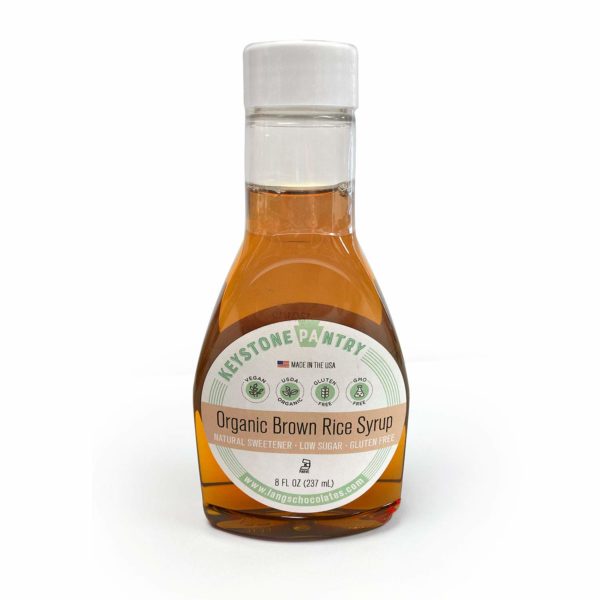
Keystone Pantry Organic Brown Rice Syrup is an organic brown rice syrup with a light-bodied flavor.
It comes in a small eight ounce bottle, so it’s a good choice for the occasional user who doesn’t need a huge amount of brown rice syrup sitting on the shelf. Thanks to its ease of use and organic certification, it’s our top pick.
2. Rawseed Organic Brown Rice Syrup
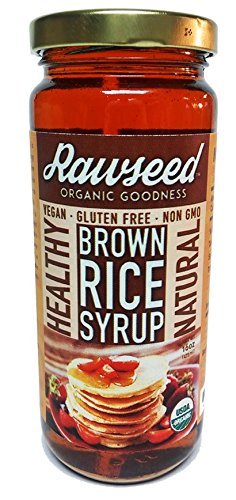
Rawseed Organic Brown Rice Syrup comes in glass jars that are well-suited for recipes that call for precisely measured amounts of brown rice syrup.
It’s less convenient if you are mostly intending on adding a bit of brown rice syrup to beverages; if this is the case, brown rice syrup that comes in a flip-top or bottle would be a better choice.
3. Clearspring Organic Rice Malt Syrup
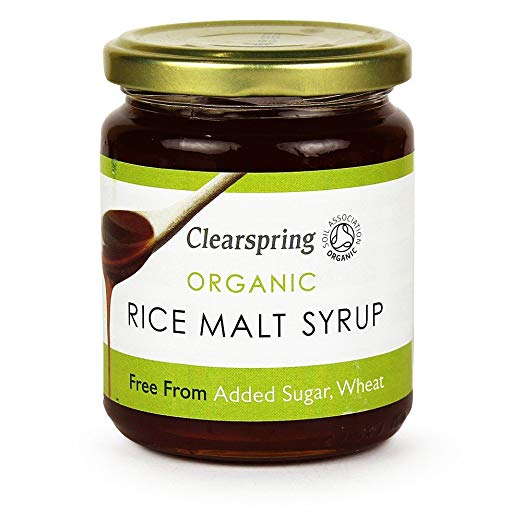
Clearspring makes an organically grown brown rice syrup that has a deep richness to it that you won’t get in lighter and milder brown rice syrup.
It’s good for adding a hint of complexity to green or white teas, and the glass jars are small enough to keep in a drawer or on the shelf.
4. Biona Organic Brown Rice Syrup
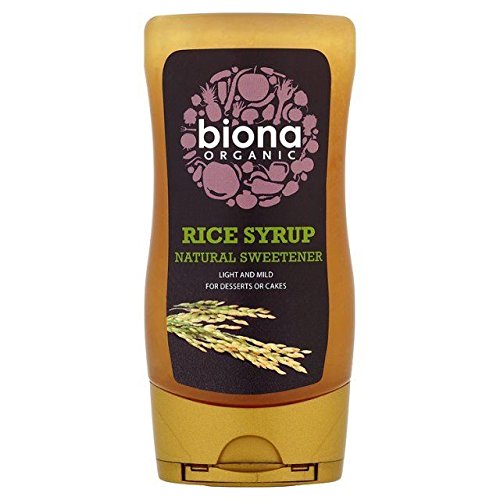
Biona Organic Brown Rice Syrup comes in a 12 ounce bottle with a flip-top that makes it easy to add a little sweetener to hot tea or coffee.
It’s organically grown, which makes it a great pick for those worried about the purity of their brown rice syrup.
5. Ottogi Korean Rice Syrup

Ottogi makes a traditional Korean brown rice syrup that’s an excellent choice for Asian dishes that specifically call for brown rice syrup.
It’s imported directly from Korea and comes in a large 42 ounce plastic bottle that is well-suited for cooking large dishes.
6. Chung Jung One Rice Syrup
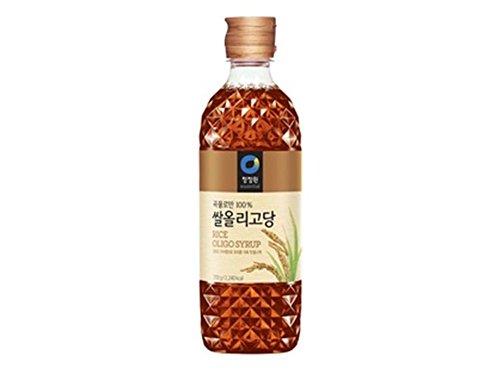
Chung Jung One Rice Syrup is another imported brown rice syrup that’s particularly well-suited for cooking Asian food.
While the bottle is not quite as convenient for cooking, it’s nevertheless a great option for authentic cooking and flavoring.
7. Brewmaster Brown Rice Syrup
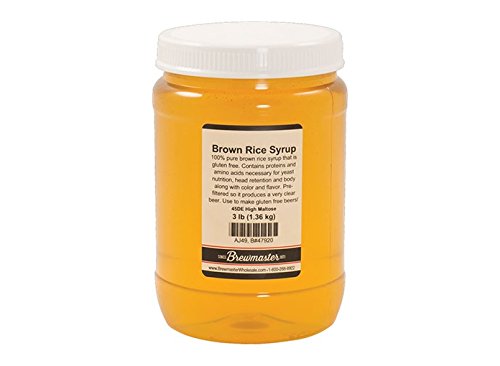
Brewmaster Brown Rice Syrup comes in a huge three pound tub, and is geared specifically for homebrewers who want to use brown rice syrup as a mildly flavored source of glucose for fermenting beer.
If you need a bulk source of brown rice syrup for brewing, cooking, or any other application, this is your best option.
8. NOW Foods Brown Rice Syrup
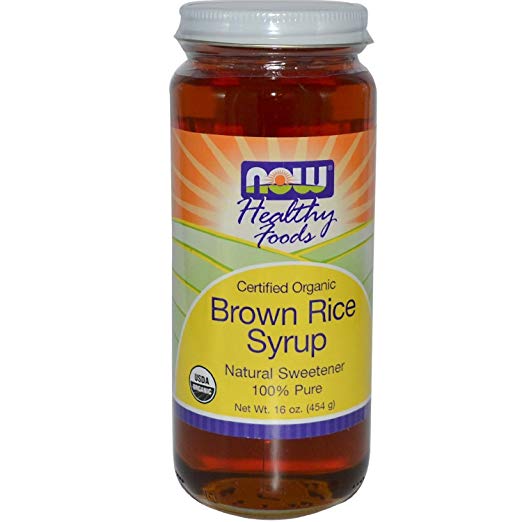
NOW Foods makes a brown rice syrup that is lighter and milder than some of the darker and richer brown rice syrups on the market. It’s organically certified and comes in a 16 ounce jar, and is overall a solid but not outstanding pick.
9. Lundberg Sweet Dreams Brown Rice Syrup
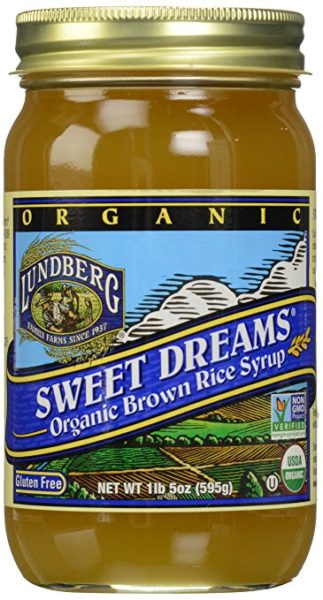
Lundberg is well known for its rice cake and dry rice products, so it makes sense that they would also make a brown rice syrup.
This 21 ounce jar contains quite a bit of brown rice syrup, but it’s not quite as convenient to use for hot drinks as a flip-top bottle. Still, it’s organically certified, so the ingredients are high-quality.
10. Sweet Cloud Brown Rice Syrup
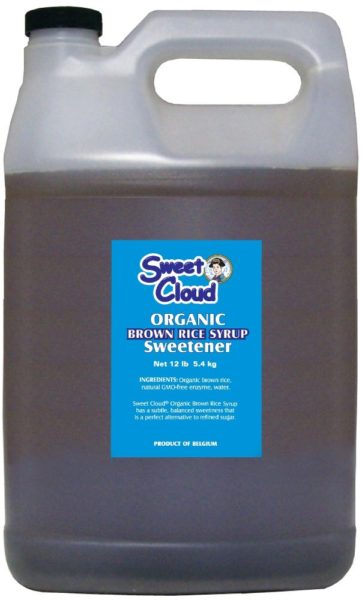
Sweet Cloud Brown Rice Syrup has a deep and rich flavor, it has the bonus of being certified organic and kosher. While the bulk size might be too big for some users, the volume is great if you’re cooking for a big social gathering.
Category winners
Best brown rice syrup overall: Keystone Pantry Organic Brown Rice Syrup
Keystone Pantry makes a brown rice syrup that’s organic, gluten-free, and comes in a perfectly-sized eight ounce bottle. For a versatile fructose-free sweetener, it’s our all-around winner.
Best brown rice syrup for stir fry: Chung Jung One Oligo Rice Syrup
For Korean recipes like tteokbokki, there’s no better choice than Chung Jung One Oligo Rice Syrup. This authentic Korean rice syrup adds just the right amount of sweetness and stickiness to stir-fried foods.
Best organic brown rice syrup: Keystone Pantry Organic Brown Rice Syrup
To keep your recipes free of pesticides and synthetic fertilizers, Keystone Pantry is the way to go. It’s simple, pure, organically-certified, and non-GMO.
Best brown rice syrup for a sugar substitute: Rawseed Organic Brown Rice Syrup
Cutting out fructose from your diet? Rawseed’s thick rimmed glass jars are easy to measure out of, making it a good pick for a sugar replacement.
Best brown rice syrup for asian recipes: Ottogi Korean Rice Syrup
For general-purpose cooking that’s true to the roots of Asian cuisine, Ottogi Korean Rice Syrup is our favorite. Since it’s imported directly from Korea, there’s no better addition to your pantry.
Best bulk brown rice syrup: Sweet Cloud Brown Rice Syrup
Cooking in bulk for a family get-together? Sweet Cloud is by far your best option, providing a full gallon of organic brown rice syrup. While casual users should opt for something else, if you know you’ll need a lot of brown rice syrup, there’s no better pick.
Who should buy brown rice syrup?
Brown rice syrup is great for individuals looking to add some all-natural sweetness to their food that’s not table sugar. It’s safe for most people to consume, but should be avoided by persons with diabetes, pre diabetes, obesity or those who have a family history of these.
Brown rice syrup may be especially beneficial for athletes since it will help deliver a strong insulin response that helps build muscle, boost recovery and supersaturate glycogen stores. Pregnant women and children should not consume brown rice syrup as no long term studies exist to guarantee safety.
How we ranked
Arsenic can be an issue with brown rice syrup, so purity was of utmost importance for us. Arsenic is naturally found in rice but can be abnormally high in brown rice, making brown rice syrup susceptible to potentially high levels of arsenic.
Unfortunately, organically grown crops don’t escape the arsenic levels. That being said, we did prefer organic products like Keystone and Rawseed, because this still reduced the exposure to other harmful pesticides and additives that may sneak in with non-organic products. We also made sure all products were 100% pure brown rice syrup and contained no fructose, gluten, or anything artificial. Any product that was not 100% brown rice syrup was axed.
Regarding packaging, because brown rice syrup is unaffected by sunlight, having a clear or dark bottle made no difference to us. Glass bottled products like Clearspring had a slight edge because they’re better for the environment.
Benefits
Brown rice syrup is high in glucose. Brown rice syrup is made by soaking brown rice in water and extracting the glucose contained in the rice starch. Its high glucose content is both its main advantage and primary downside.
Its glycemic index, or GI, is much higher than table sugar, so it causes a fairly sharp rise in blood sugar levels.
On the other hand, it’s completely devoid of fructose, which means it does not affect liver health and metabolic function to the same degree as something like table sugar, high-fructose corn syrup, or agave nectar.
Brown rice syrup should be a small part of your overall dietary sweetener intake. Eating a diet heavy on foods with high ratings on the GI scale can raise the risk of developing obesity, diabetes and other crippling modern diseases. (1, 2)
Cutting added sugar in the diet may be one of the most powerful choices you can make to improve health and lower the risk of developing serious diseases. (3, 4)
For anyone with a sweet tooth, the challenge of satisfying that desire in the least harmful manner can be a confusing question.
Brown rice syrup is made by exposing cooked brown rice to enzymes that break down the starch and turn it into simple sugars. Once the impurities are filtered out, the remaining dark brown syrup contains three kinds of sugar: maltotriose, maltose, and glucose.
Even though the list makes it look like there’s very little glucose, that’s not the case at all; maltose is really two glucose molecules, and maltotriose is three.
By the time brown rice syrup reaches the small intestine, it’s been converted into glucose, and is ready to go to work, spiking blood sugar levels and tweaking your metabolism.
Because of its dark color, brown rice syrup may look like a healthy food, but most of the nutrients in brown rice are lost along the way. The remaining amounts of potassium and calcium are negligible.
Glucose may not have all of the negative adverse effects of glucose, particularly when it comes to your liver. Learning how fructose and sucrose affect the system can help you sort out questions about including brown rice syrup or other sweeteners in your diet.
Since the detrimental effects of fructose are well-known, health-conscious people tend to avoid sweeteners containing fructose (like high fructose corn syrup, or HFCS).
But all fructose doesn’t affect our bodies the same way; fruits contain fructose, but because fiber slows down the rate of sugar assimilation, moderate fruit consumption can be part of a healthy diet.
And while starchy foods like potatoes contain glucose, eating potatoes may not have the negative impact on metabolic health refined sugar does.
Fructose can only be metabolized by the liver (5), but every cell in the body can use glucose.
When the liver metabolizes fructose, one of two things happens: (6, 7, 8). Either fructose is converted to fat, which can lead to fatty liver syndrome and insulin resistance, or fructose is sent into the bloodstream, which raises triglycerides.
Since brown rice syrup doesn’t contain fructose, the energy can be utilized without passing through the liver. While the spike in blood sugar levels is still undesirable, it may be a healthier way to add sweetness to foods with respect to liver function and metabolic function.
In view of the fact that it’s just another added sugar in the diet that can create and escalate physical imbalances leading to disease and dysfunction, this may be the most positive statement it’s possible to make about brown rice syrup.
Side effects
Rice is a well-known biological reserve of arsenic, a heavy metal that is highly toxic and is associated with a number of chronic diseases, like cognitive decline, Alzheimer’s disease, and cancer (9).
When random organic brown rice syrups were tested for arsenic, significant levels of the chemical were found. Infant formulas sweetened with brown rice syrup contained up to 20 times the amount of arsenic as formulas using other products to enhance flavor. (10)
Though we can’t completely avoid chemicals and contaminants, it’s a blow when organic brown rice and syrup contain arsenic.
This suggests that using a lot of brown rice syrup could lead to unacceptably high levels of arsenic in your diet, so it’s probably best to keep your brown rice intake at a moderate level.
Even unprocessed dry brown rice contains arsenic, though, so it’s not clear to what extent the concentrating process used to make brown rice syrup creates higher levels of arsenic in the final product.
Though brown rice syrup is derived from brown rice, the fact that all of the fiber has been removed in processing means the spike in blood sugar is much higher than a comparable amount of whole brown rice.
Dietary fiber slows down the rate at which carbohydrates are absorbed in your stomach, which blunts the rise in blood sugar. Since brown rice syrup is lacking fiber, this mechanism is not in play, hence the very high glycemic index.
One of the top hypotheses on the cause of the obesity epidemic is the so-called carbohydrate/insulin model, which posits that high intakes of refined carbohydrates are largely to blame for weight gain and metabolic dysfunctions like type 2 diabetes (11).
In this model, eating a meal that is very high in refined carbohydrates (for example, pancakes with a hefty amount of maple syrup) causes a spike in blood sugar, which is exactly what we would expect given the high glycemic index of brown rice syrup.
Then, since blood sugar has unexpectedly shot up, the body excretes a large amount of insulin to drive down blood sugar. Insulin, which pulls glucose out of the bloodstream, causes an uptick in intracellular glucose concentrations.
Once all this extra sugar is lying around in your body’s cells, it is converted to fat for storage. Problems continue after this blood sugar crash: low blood sugar levels make you hungry, and if you eat another meal that is high in refined carbohydrates, the entire cycle starts all over again.
While debate continues on the precise extent to which carbohydrates, and refined carbohydrates in particular, are to blame for weight gain, it’s clear that having a lot of sugars and simple carbs in your diet is not healthy.
FAQ
Should you refrigerate brown rice syrup? In general, brown rice syrup can be stored in a refrigerator in order to extend its shelf life, but this is not a requirement. On average, brown rice syrup will last about one year when not refrigerated.
What is brown rice syrup? Brown rice syrup is a byproduct of brown rice that is created when combining brown rice with naturally-occurring enzymes in order to produce a thick syrup-like substance noted for its mild sweetness. This substance is also known as rice malt, and it is most often used as an alternative to regular sweeteners, such as sugar. The final product includes various sugars including maltotriose, maltose, and some glucose. The makeup of brown rice syrup is very similar to pure glucose, and brown rice syrup can be used similar to honey as a binding agent when making food products like granola or cereal bars.
Is brown rice syrup healthier than sugar? In terms of glycemic index, sugar is much healthier than brown rice syrup. Sugar has a glycemic index of 65, while brown rice syrup has a glycemic index of 98 meaning that table sugar has less of an immediate impact on blood sugar levels, as compared to brown rice syrup.
Is brown rice syrup healthier than fructose? Fructose is harder for the body to digest in large amounts and may result in insulin resistance. In comparison with fructose, brown rice syrup is the better option in terms of health effects.
Where do you buy brown rice syrup? Brown rice syrup is available for purchase pretty much everywhere online. In America, brown rice syrup is most commonly sold by Amazon, Walmart, and local small businesses producing their own natural products. It is unlikely that you will find brown rice syrup when you go to the grocery store.
What are the dangers of brown rice syrup? The most significant danger of brown rice syrup is its incredibly high level of sugar. For those with diabetes, prediabetes, or obesity, this is not an ingredient that is beneficial to maintaining an ideal level of health. The consumption of brown rice syrup leads to an inevitable spike in blood sugar levels, which is a major risk for people in these populations.
What can be used instead of brown rice syrup? In terms of alternatives to brown rice syrup, there are many options including honey, corn syrup, and maple syrup. All of these alternatives have significantly lower glycemic indices, making them healthier options and they all have a similar consistency and can be used to bind ingredients together. If you are simply looking to sweeten food or beverages and do not require a sweetener with a syrup-like consistency, any sugar alcohol (erythritol or xylitol, for example) will do just fine.
Is brown rice syrup low glycemic? Brown rice syrup is not low glycemic. Naturally-occurring glucose has a glycemic index of 100, and table sugar has a glycemic index of 65. In comparison, brown rice syrup has a glycemic index of about 98, which makes it very similar to pure glucose. Therefore, brown rice syrup has an extremely high glycemic index and is significantly higher on the index than regular table sugar.
What does brown rice syrup taste like? Brown rice syrup is often described as having a relatively sweet taste with hints of nutty flavoring. In terms of sweetness, many describe brown rice syrup as being much less sweet than other sweetener products, including table sugar.
Does brown rice syrup contain fructose? Brown rice syrup does not contain fructose, which is one of the only major benefits of this sweetener. Fructose can only be absorbed in limited amounts by the body, and many theorize a connection between increased consumption of fructose and the eventual development of diabetes. Studies also show that fructose consumption may lead to insulin resistance and weight gain. Because brown rice syrup is very similar to being 100% glucose, the body is more capable of absorbing and metabolizing the substance (12).
Is brown rice syrup healthy? While the glucose levels of this product make brown rice syrup a better option when compared to fructose-based products, brown rice syrup is not the healthiest option when it comes to sweeteners in general. The major negative connotation associated with brown rice syrup is the high glycemic index that can lead to a major spike in blood sugar levels. Though this would not be a major issue for a fit person consuming brown rice syrup in a meal post-workout, the average population and those with diabetes or pre-diabetes should try to avoid consumption of brown rice syrup. There are also very few nutrients found in the substance, making this product lack a significant nutritional value and essentially a waste of calories (13).
Is brown rice syrup natural? Brown rice syrup is considered 100% natural, as it is produced by combining brown rice with natural enzymes.
Is rice malt syrup the same as brown rice syrup? Yes, rice malt syrup and rice syrup are the same things; they just have different names.
Where is brown rice syrup used? Brown rice syrup is often used in natural cereal, cereal bars, energy drinks, and some baby formula’s.
Is brown rice syrup gluten-free? Because brown rice and other rice products are considered gluten-free, brown rice syrup would be acceptable to consume while eating a gluten-free diet. As long as the rice is cooked properly, there should be no issues caused by brown rice syrup when pursuing a gluten-free diet.
Does brown rice syrup have arsenic? Brown rice syrup can have trace levels of arsenic in it, but these levels are not of major concern. Arsenic is naturally found in rice products and at a higher concentration in raw rice, in particular. When cooked properly, there are usually no medical concerns related to the levels of arsenic in rice (14).
What is arsenic? Arsenic is a naturally-occurring chemical that is found in groundwater sources as well as minerals within the ground. Many plants begin to absorb arsenic through water and ground contact, thus increasing the presence of arsenic in many plants. Rice plants are often known for their absorption of arsenic while growing. In large amounts, arsenic can be deadly and is considered a carcinogen. The United States Food and Drug Administration has set standards for the amount of arsenic acceptable in foods on the market, setting defined values for levels that are of concern to the consumer. In trace amounts, there are very few, if any, medical consequences of interacting with arsenic.
Is brown rice syrup better than maple syrup? If comparing the two products based on their glycemic indices and nutritional benefits, maple syrup is significantly more nutritional and healthy. Maple syrup has a glycemic index of about 54, while brown rice syrup has a glycemic index of 98. Maple syrup is also known to boast high levels of riboflavin, manganese, potassium, and calcium, among other nutrients. Conversely, brown rice syrup does not have much nutritional benefit at all and is often seen as a waste of calories because it does not offer much benefit to the consumer. If choosing between two sweeteners with syrup-like thick consistencies, maple syrup is the better selection.
How is brown rice syrup made? Brown rice syrup is made by cooking whole-grain rice, then adding various enzymes to break down the rice into the various sugars like maltotriose, maltose, and trace amounts of glucose. Once the liquid is strained, it’s boiled down into syrup that provides 75 calories per tablespoon.
Should you consume a lot of brown rice syrup? No, brown rice syrup should only be consumed in small doses due to its high sugar content and GI rating. Consuming foods with high Glycemic index ratings can raise your risk of developing obesity, diabetes, and other crippling modern diseases.
Does the dark color of brown rice syrup indicate its nutrient density? No, the dark color of brown rice syrup may look healthy, but really the majority of nutrients in brown rice is lost during processing, and anything leftover is pretty negligible.
Is fructose bad for you? Fructose can be very harmful to the body in high doses, so its best to avoid sweeteners containing fructose like high fructose corn syrup (HFCS). However, not all fructose affects the body the same. Fruit is a healthy option that contains fructose, and because its full of fiber that slows down the rate of sugar assimilation, fruit can be part of a healthy diet.
How is fructose metabolized? Fructose is different from other sugars because it can only be metabolized by the liver. In the liver fructose is either converted to fat or sent to the bloodstream to raise triglycerides.
Does brown rice syrup contain fructose? No, brown rice syrup doesn’t contain fructose.
Why does brown rice syrup have such a high GI? Though brown rice syrup comes from brown rice, all of the fiber gets removed during processing, causing a very strong blood sugar spike. Normally fiber slows down how quickly nutrients like sugar are absorbed, but brown rice syrup contains minimal fiber, hence the very high glycemic index.
Does rice have arsenic? Yes, rice contains arsenic, which is a highly toxic metal associated with many chronic diseases. Unfortunaetly, arsenic tends to find its way into brown rice syrup and the products it’s used in. Infant formulas sweetened with brown rice syrup were found to have 20 times the amount of arsenic, compared to other formulas using different sweeteners.
Does brown rice cause obesity? No, brown rice does not cause obesity but may be a factor contributing to it. The carbohydrate/insulin model is a hypothesis to the cause of the obesity epidemic and dictates that refined carbohydrates are largely to blame for obesity. When you eat food with a lot of refined carbohydrates, blood sugar is raised, and insulin is secreted to control it. If the sugar is not used, it quickly turns into fat and stored for future use. However, it doesn’t end there. Once the blood sugar returns to normal, you feel low, causing you to crave more carbs, causing the cycle to restart. While the debate continues on how true the hypothesis is, it’s clear that having a lot of sugars and simple carbs in your diet is not healthy.
Is brown rice syrup better than corn syrup? No, brown rice syrup is not considered a healthier option that corn syrup or even white sugar since its glycemic index is so high; despite it being considered an all natural sweater without refined sugar. In fact, the argument could be made the former options are actually better for you.
Related Articles
Recap
Having solid information about the attributes of brown rice syrup doesn’t solve the problem of finding healthy ways to stimulate the pleasure centers in the brain through eating sweets without negatively impacting metabolism.
Brown rice syrup is a pretty good way to reduce your fructose intake, but if you are trying to reduce your refined carbohydrate intake, the lack of fiber and the high glycemic index still poses a problem.
Brown rice syrup is best used as an occasional sweetener for tea, coffee, or in Asian cooking, but if it’s a regular part of your diet, it could start causing problems.
For BodyNutrition’s #1 ranked brown rice syrup, click here.